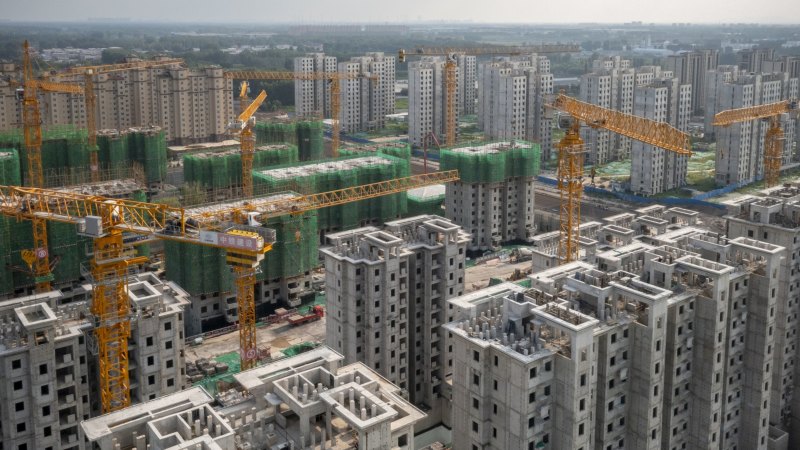Save articles for later
Add articles to your saved list and come back to them any time.
The Chinese economy will “muddle through” and defy a downturn in its property market, the Asian Development Bank’s chief economist has predicted while arguing that Australia’s biggest trade partner needs to increase competition to weed out poorly performing firms.
Albert Park, who is in Australia to talk to policy leaders about the state of the Asian economy, said the turmoil around China’s property sector would be resolved by the country becoming less dependent on housing construction and shifting to more consumer-focused sectors.
Despite concerns over China’s debt-fuelled investment in property, Asian Development Bank chief economist Albert Park believes the country will “muddle through”.Credit: Bloomberg
Global markets have been spooked by growing concerns about the state of China’s housing sector and large property firms such as Evergrande, which has helped underpin growth in the world’s second-largest economy. This has been exacerbated by fears of deflation across the country.
Last week, the Reserve Bank used its six-monthly review of the financial sector to note that stresses in China’s property sector could spread to the rest of its economy, its financial system and through to the rest of the world.
The Asian Development Bank last month slightly downgraded its outlook for the Chinese economy, forecasting it to expand by 4.9 per cent this year, rather than 5 per cent. Through 2024, it is expecting a further step down in growth to 4.5 per cent, although it is forecasting inflation to lift from 0.8 per cent in 2023 to 2 per cent next year.
Park said while the property sector had accounted for about 2 percentage points of China’s growth each year for a long period, this was coming to an end.
He said there had been excessive pessimism about China and its authorities, which have shown over recent decades they can kickstart growth in the face of major issues. Concerns that it would follow the lead of Japan and suffer a long period without growth were ill-founded.
“A lot of doomsaying about the Chinese economy is way overdone. The most likely scenario is that they’ll muddle through to some extent,” he told this masthead.
“All of the talk about deflation, a year of Japanese-style decade of lost growth, I think that’s not going to happen.”
This week, the International Monetary Fund will release its latest outlook on the global economy. In July, the fund was expecting China to record growth of 5.2 per cent this year and 4.5 per cent in 2024.
Analysts are expecting the fund to downgrade its expectations for China because of recent events.
Park said the Chinese economy would slow, but the question was by how much and when it started to approach the growth levels normally associated with rich nations such as Australia and the United States.
“Structurally, the Chinese economy is growing slower and slower over time,” he said.
“It’s an ageing society, it’s had a very steady productivity slowdown for a decade or more, the labour force is shrinking in absolute terms … these are structural things we know are going to produce slower growth going forward.
“It’s just a question if they can get back to five, six, seven [per cent growth] versus three, four, five. I don’t think it’s set in stone, I think it also depends on their policy choices.”
Park said a long-standing issue for Chinese authorities was the conservative nature of consumers and the heavy investment of the government in supply-side responses to economic slowdowns.
He said even when dealing with climate change, the government was more interested in subsidies for production than encouraging consumers to spend their pent-up savings on ways to reduce their greenhouse emissions.
According to Park, authorities needed to start looking at ways to make the overall economy more dynamic.
“It reflects to me a bigger concern of economic policy. It tends to not really emphasise competition, and be more protective of firms and be more state-led,” he said.
Cut through the noise of federal politics with news, views and expert analysis. Subscribers can sign up to our weekly Inside Politics newsletter.
Most Viewed in Politics
From our partners
Source: Read Full Article






